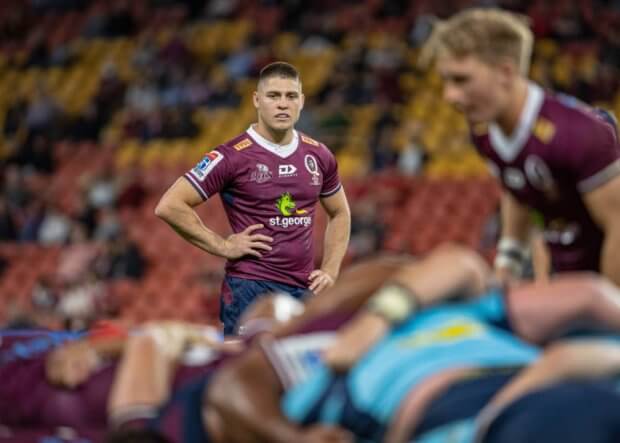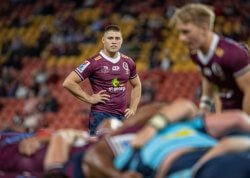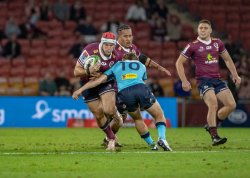Wednesday’s Rugby News looks at the career transformation of James O’Connor, U20 coach Jason Gilmore’s warning to fans, Nick Frisby’s stunning admission ahead of his return and the push to reduce substitutions
[one_half last=”no”]
Wild child no more
Reds captain Liam Wright has praised the transformation of reformed bad boy James O’Connor as he looks to guide the Reds to the Super Rugby Australia title.
O’Connor has had a wild journey throughout his career, experiencing a rapid turn from ‘the next big saviour’ to ‘fallen angel’ at an alarming rate.
However, the 30-year-old has appeared to matured mentally and spiritual after his time in England, which was on full display last Saturday as he iced the game for the Reds.
This hasn’t gone unnoticed in the eyes of the Reds skipper, who was full of praise for the man that he has become, believing that the time he invested in himself off the field is starting to show on it.
“From what I watched growing up of James O’Connor he’s a completely different person,” Wright said.
“He’s a really good fellow to be around. He’s a leader in our group.
“He puts a lot of time into his craft which I think upon reflection on his 30th birthday, that’s what he sort of figured out was missing from earlier years.
“He just invests a lot into himself, into this team and I think the results are starting to show really well.”
The Reds are preparing for their first taste of the FIFO lifestyle that awaits away teams, with Wright likening it to preparing for a club footy game.
“A lot of our boys have come through the club footy system, which is kind of similar, you don’t have all the luxuries before and after you’re just going there to play footy and enjoy that,” he believes.
“We’re really looking forward to getting back to basics like that.”
[/one_half][one_half last=”yes”]
Gilmore’s warning
With the Australian rugby community continuing to fawn over the next generation of players coming through, their former U20s coach Jason Gilmore is urging for patience as they continue to develop.
Having taken over as defensive coach for the Waratahs, Gilmore is well aware of the young talent that is coming through the grade at the various Australian Super Rugby clubs.
However, he has urged fans and selectors to be patient with this group and not treat them like “28-year-old veterans”, fearful at the increased pressure that they may receive due to their inconsistencies.
“They’re always the new thing, they get signed quickly and pitch-forked into playing Super Rugby really quickly and because teams in Australia in the last few years traditionally haven’t done so well, teams are chasing victories,” Gilmore said.
“The added pressure that gets placed on the young guys is almost like they’re judged like they should be 28-year-old veterans.
“When their performances aren’t consistent as a 19 or 20-year-old, you can see some of the guys losing their contracts and going overseas. You’ve got to pay overs to get them back.”
Despite this, Gilmore admitted that he was impressed with the way that the likes of Harrison, Lolesio and Wilson had stepped up to the rigours of Super Rugby, believing that their competitiveness sets them apart from the rest of the squads that he has had.
“What this current block has shown is how quickly they have been able to handle playing Super Rugby well and I think that’s been the most satisfying thing from my perspective,” he said.
“You only have to look at the weekend’s efforts; Noah Lolesio at the Brumbies has continued his form from the first couple of rounds. Will Harris debuted. [Reds duo] Harry Wilson and Fraser McReight played really well again.
“Knowing the boys personally, they are so competitive and they want to win. That is probably the thing that has separated them from some of the other younger guys that have come through. These guys want to win and win now.”
[/one_half][one_half last=”no”]
Frisby’s fightback
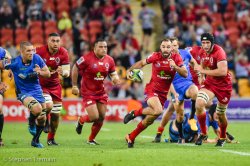
As he prepares to return from Rugby’s wilderness, former Reds and current Force halfback Nick Frisby has admitted that his axing from the Queensland set-up was the wake-up call that his career needed.
Frisby found himself out of favour at the Reds, failing behind Moses Sorovi in the pecking order just 12 months after representing his country.
Coupled with a demotion to club rugby after he failed to attend a recovery session on the account of a late-night drinking session, Frisby’s time with the Reds was abruptly cut short with two years left on his deal in 2018.
Having spent time at French side Bordeaux and then spent the better part of two seasons with Glasgow, Frisby believes that the decision by current coach Brad Thorn to sack him was a blessing in disguise.
“I think I was just so comfortable in Queensland,” he told RUGBY.com.au.
“I’d lived there my whole life, I’d been at the Reds for eight years I think by then and I took my opportunities a little bit for granted.
“I had a few incidents off the field as well…Thorny had the balls to stand up and say, ‘Look it’s time to move on’, and I respect that and it’s been good for me.”
As a result, he harbours no ill-feelings towards his former club, with the focus now solely on impressing his old club coach Dave Rennie.
“I don’t hold any grudges or any regrets about how it all played out,” he said.
“It’s been good to, after that, to get out of Australia and go and try something different overseas and I’ve really enjoyed that but in saying that, really excited to be back in Australia now.
“I’ve really missed being at home and excited to get back into Super Rugby over here.”
[/one_half][one_half last=”yes”]
Reduced subs on agenda
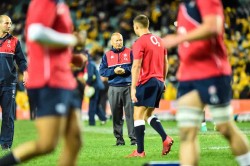
As the game continues to innovate, World Rugby chairman Bill Beaumont
has backed the move to reduce the number of substitutions once international competitions are able to return from the COVID break.
The move would see teams limited to just five or six changes throughout the match as the code looks to make matches more open whilst reducing the number of high-impact collisions.
England coach Eddie Jones is a firm supporter of the move and Beaumont has confirmed that they will look to trial it in elite competitions whilst reassuring fans and players that special dispensation would be given if a player picks up a genuine injury and can not be replaced.
“Our priority is getting people playing again and getting a structure to the season for the rest of this year but after that, we are going to be looking at this [replacements] without doubt,” Beaumont told The Times.
“Personally, I’m an advocate of reducing the amount of substitutes but to do so bearing in mind that player welfare is paramount and no injured player should be forced to remain on the field as they were in my day.
“At the moment there’s almost no change in the pace of the game if you can change more than half the team. We have to trial it in elite competition to ensure you don’t have any unexpected consequences from the change.”
World Rugby is already in the process of studying the effects of this reduction, attempting to determine whether replacements are more likely to cause injury to fatigued players or if it is fatigue itself that made it more likely that one starter causes injury to another starter.
Whilst I like the concept of the idea, I do question what’s deemed to be an ‘injured player’ as it seems to open up a very grey area for coaches to exploit.
[/one_half]

